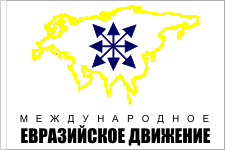The International Eurasian Movement (Международное евразийское движение) is a Russian NGO led by Neo-Fascist ideologue Alexander Dugin, it acts as part of his Eurasia Movement, directed at the international community, before the Donbas War the NGO had affiliations with organisations in the Ukrainian far-right, such as the Brotherhood party, Brotherhood’s leader Dmytro Korchinsky was even a member of the Movement, but later left after its Anti-Ukrainian agenda became blatantly obvious:
In order to counter the largely imaginary threat of a “colour revolution” in Russia, the authorities sanctioned the creation of several “patriotic” youth movements: “Nashi” (Ours), “Rossiya molodaya” (Young Russia), “Molodaya gvardiya” (Young Guard), and some others. One of those movements wasEvraziyskiy soyuz molodezhi (Eurasian Youth Union, ESM) – under the leadership of Pavel Zarifullin and Valeriy Korovin – a National Bolshevik youth wing of Dugin’s Mezhdunarodnoe evraziyskoe dvizhenie (International Eurasianist Movement, MED). It is unclear who funded the ESM from 2005, but an analysis of the Russia-based Centre of Economic and Political Reforms shows that the ESM received several presidential grants amounting to more than 18.5 million Russian rubles in 2013-2014.
The ESM was active not only in Russia, but also in other countries, including Ukraine. During 2005-2007, branches of the ESM were established in the Ukrainian cities of Kyiv, Kharkiv, Sumy, Sevastopol and some others. These branches cooperated with the Ukrainian cells of the Natsional-Bol’shevistskaya Partiya (National-Bolshevik Party), as well as with Ukrainian far right parties such as the Rus’ky blok (Russian bloc), the misleadingly named Prohresyvna sotsialistychna partiya Ukrainy (Progressive Socialist Party of Ukraine, PSPU) led by Natalya Vitrenko, and “Bratstvo” (Brotherhood) headed by Dmytro Korchynsky. Both Vitrenko and Korchynsky were members of the Highest Council of Dugin’s MED.
The Ukrainian branches of the ESM remained on the margins of the Ukrainian political life, while most of its activities were limited to anti-NATO protests and other similar anti-Western actions, and did not produce any significant result in terms of undermining the Ukrainian state. Moreover, some of the Ukrainian members of the ESM did not share the radical anti-Ukrainian ideas of Neo-Eurasianism. For example, after two Russian members of the movement and one Ukrainian activist of the ESM vandalised Ukrainian state symbols on the Hoverla mountain in 2007, this led to the split in the Ukrainian ESM, as many did not support this act of vandalism. This also led to the termination of any cooperation between the ESM and “Bratstvo”, and Korchynsky left the Highest Council of the MED. The radicals, however, welcomed the act and were outspoken in their resentment of Ukraine’s sovereignty and territorial integrity.
The movement was also an early sponsor of the Donetsk separatist cause, attempting to organise the division of the region from Ukraine well before the Donbas War eventually broke out:
Yet another pro-Russian organisation that Dugin’s Neo-Eurasianists cooperated with in Ukraine was the “Donetskaya Respublika” (Donetsk Republic, DR). This organisation was created in summer 2005 by Andriy Purgin, Oleksandr Tsurkan and Oleh Frolov, as a response to the “Orange revolution” and presidency of Viktor Yushchenko who advocated pro-Western foreign policy of Ukraine. The DR was officially registered in December that year, but already in autumn leaders of the organisation took part in the protest demonstration in Kyiv together with the activists of the ESM.
In November 2006, DR and ESM activists collected signatures to hold a referendum on the independence of the “Donetsk republic”. The referendum never took place, but the SBU and police took notice of the group, and cases were brought against the leaders of the DR under three articles of the Ukrainian Criminal Code: (1) “Actions aimed at the forcible change or overthrow of the constitutional order or the seizure of state power”, (2) “Infringement on the territorial integrity and inviolability of Ukraine”, and (3) “Violation of citizens’ equality based on their race, nationality or attitude to religion”. The criminal cases hindered the process of building the DR as a functional structure; in 2007, a Ukrainian court outlawed the DR, and it went underground.
Return to 000. MOC Notables Pro-Russian
